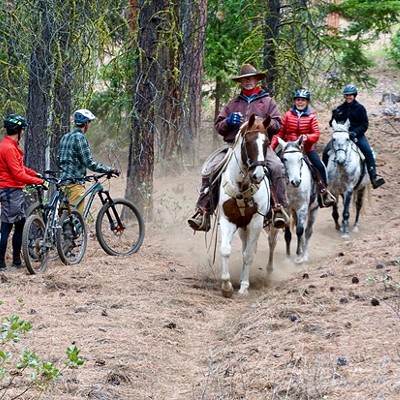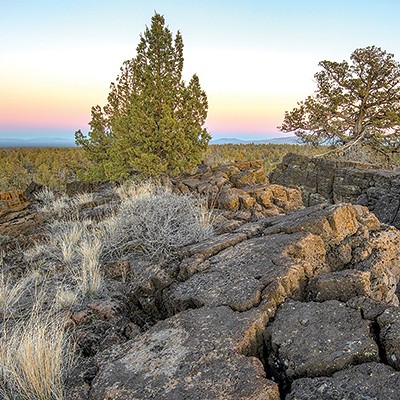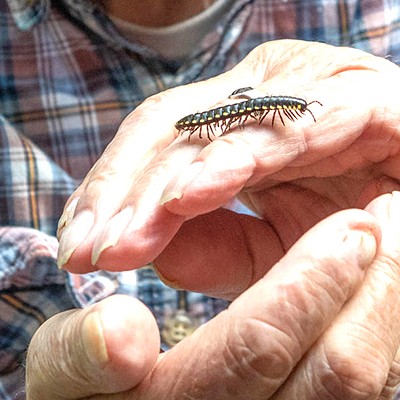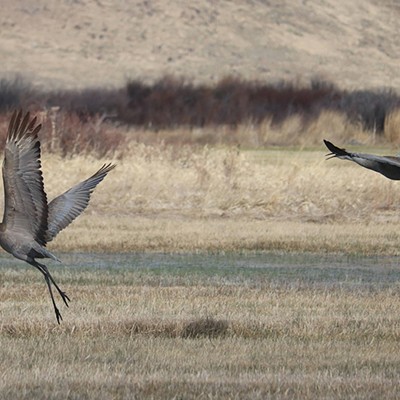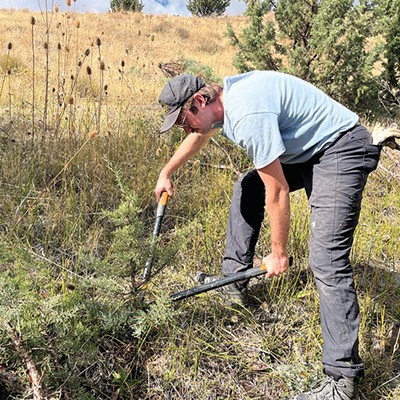Mule deer—thanks in part to those residents who continue feeding them in their yards—are a bane to anyone trying to start or maintain a vegetable garden. Ask anyone in Sisters (in spite of the city ordinance against feeding deer) how much it costs to battle deer bent upon eating their garden and landscaping into oblivion, and you'll get a big frown.
Mule deer are the property of the state. Therefore, in my way of looking at this situation, the state is responsible for the behavior of their animals. One mule deer can eat from 6-to-8 pounds of hay a day, I've been told the Oregon Department of Fish and Wildlife provides fencing for hay farmers to keep foraging deer from eating the hay farmer's income, but what about those of us with deer plundering our kitchen gardens?
Looking at the amount of forage a deer requires daily amounts to a lot of carrots, lettuce, spinach, raspberry plants, landscaping—or for some brave soul who thinks he can get way with growing it here—corn. So, one could ask, why doesn't ODFW provide fencing for all Deschutes County residents who want to grow veggies in their kitchen garden?
Perhaps it's time to notify ODFW that offending mule deer destroying one's kitchen garden will be treated as personal livestock, and therefore said deer is then found guilty of trespassing on private property and is legally harvested.
No matter how you look at mule deer in our backyards, it is long past time for Deschutes County to pass a no-feeding deer ordinance like that of Sisters. In time the moochers will be chased off by pet dogs, or eliminated by hunting seasons, motor vehicles, or unfortunately, poachers.
But, in the meantime, how do we keep deer from devouring our landscaping and kitchen gardens? Well, if you Google "Keeping deer out of your garden," you'll bring up a zillion products that the manufacturers swear will work.
A sight I will never forget is that of Amanda Egertson, Deschutes Land Trust's Stewardship Director, battling deer bent upon eating all the native grasses she was trying to restore in the Metolius Preserve.
Time and time again, week after week, Amanda planted more grasses and used this or that repellent, and each failed. She finally found one that worked, however, and the deer left her grasses alone—but the smell from the stuff was enough to gag a maggot.
Deer have an excellent sense of smell, so those repellants that contain predator urine and/or rotten eggs probably will work—until it rains, and it has to be applied again. There are a lot of websites for that stuff, and depending on how and when they're applied, it may be worth checking out. But then, I've also heard that the methods for collecting such animal repellants are not something to discuss at the dinner table.
There are only a few ways to actually keep deer from eating you out of house and home that really work, and fencing is the best. But that said, stay away from that black plastic netting that's almost impossible to see. We put that up and the birds around our place started running into it, so we took it down immediately. Hog-wire fencing with white string attached to poles at about 6-inch spacing, up to about 6 feet, works very well.
Sure, a guard dog will also work, but you'll have to put up with the incessant barking. Getting up in the middle of the night to scare mule deer out of your yard every time you wife whispers, "The deer are back" works, but you'll lose a lot of sleep, and you may bump into a cougar doing so. I'd forget that one.
Pat Callender up in BC says, "We have a 'deer proof' recipe in Nanaimo, British Columbia, where they [deer] come wandering through our yards and eat everything in sight! It is as follows: 1 egg yolk [only], l liter of water, and 1 tablespoon if baking powder. Mix well and spray on shrubs, trees, and roses every two weeks. Keep in tightly sealed container in your fridge until all used up." Another person added, "I find the eggs with Tabasco sauce works also. I'll add garlic to my next batch. 1 gallon water, 6 eggs, and Tabasco to taste!!"
But then another person warned about unintended results from the egg and garlic goop, "The egg mixture truly works on deer, and it drives the buzzards crazy looking for road kill. They [the buzzards] landed on my fence and looked for hours for their dinner."
Another frustrated gardener came up with a repellant that's free. "I get human hair from the woman who cuts my hair and put it around my plants. It keeps the deer away and it doesn't smell bad. It also seems to keep rabbits and raccoons away when I put it in my veggie garden."
Scare devices, such as sound-activated sprinklers are expensive and require a lot of effort to install, but some people swear by them as the best repellant for keeping one's garden safe from mule deer. They'd also work to prevent your neighbor's dog and cat from using your backyard as a waste depository.
There's a website I found that provides a whole bunch of different methods for keeping deer out of your garden: wikihow.com/Keep-Deer-Out-of-Your-Yard. You may like one or two of those ideas.
Whatever you find that works, please, by all means, send the Source a letter-to-the-editor and share your good news. May The Force be with you.


